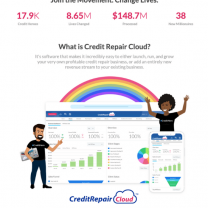How Long Does a Repo Stay on your Credit?
If you took a loan to purchase a car or a property but failed to clear off the loan within its timeline, chances are, your lender will repossess the vehicle or property you bought on Credit. Repossession, also known as ‘repo’, manifests in your credit history when your lender takes back the item you purchased but has failed to clear off the payments. When you register for a car or property loan, your lender has a legal mandate to take the vehicle or property when you fail to clear off your loan repayments on time. This often happens when your lender has tried, but in vain, to convince you to clear the dues.
How does a Repo affect my Credit?
Your credit history is primarily determined by your credit scores, in the sense that the more favourable credit scores you have, the more profitable your credit history becomes. A history of late repayment can harm your credit score. Lenders check their debtor’s repayment history to ascertain whether or not they are capable of repaying loans. Because a repo is a result of late payment, it can severely spoil your credit history. You have minimum chances of securing any loan in the future if you have a repo on your Credit. No matter how long a repo stays on your Credit, your chances of qualifying for future loans diminish the moment a repo shows up on your credit history.
How Long Does a Repo Stay on Your Credit?
Any moment a repo shows up on your Credit, you will have to wait for up to seven years to get it removed. A repo will stay on your Credit for seven years even if you clear off your payments past the due date. Your credit account will be harmful as long as you do not clear off your expenses. However, if you clear off your payments, the repo will stay on your Credit for seven years, but your credit history will be positive. If you fail to clear off your payments, your lender will invite a collection agency to collect the balance. You will incur extra costs of paying the collection fees in such a situation, but the repo will remain on your Credit for seven good years.
Your lender will automatically remove the repo on your Credit after seven years if you manage to clear all your payments. Although laws regarding repo vary from state to state, the standard period for repo to stay on your Credit is seven years. Your lender will count the seven years starting from the day you first failed to make your payment. During these seven years, your credit account will be harmful unless you clear your payments. However, the negative credit report will be history if you are determined to improve your credit history. Adverse credit history fades with time if you purpose to clear off your late repayments.
How to Build Your Credit Score after Repo
It can be challenging to enhance your credit score after a repo has been featured on your credit account. However, you can record a positive credit history even if, at some point, you recorded negativity if you demonstrate your commitment. If you want to know how you can build your credit scores, read the steps outlined below.
• Clear off your payments
You have to clear off your payments to refurbish your credit scores. You need to ensure you do not have any record of late charges if you want to improve your credit scores after repossession takes effect. Clearing off payments refer to the process of making past due date payments current. You also need to clear off all your payments
• Negotiate your Terms of Payment
Suppose you can afford to convince your creditor about your current negative financial situation and promise to improve your payments under newer terms. In that case, your creditor might be obliged to review your repayment terms. You need to negotiate for fees terms you can efficiently work for. You can let a credit company negotiate on your behalf in writing.
• Stop Missing Payments
Because your repayments determine the face value of your credit history, you need to make all your loan repayments on time to ensure you do not record any late payments. You can set up automatic payments from your account to ensure you do not miss any charges, even if you forget.
• File a Dispute with the Credit Bureaus
A repo on your credit account can either be valid or invalid. If you think the repo on your credit account is invalid, then you have to file a dispute with the credit bureaus to get it removed. You can contact various credit repair companies to eject the repo from your credit history.
The Takeaway: How Long a Repo Stays on your Credit
A repo or repossession can feature on your credit history for seven years whether you clear off your payments or not. Having a repo on your credit account can severely affect your probability of securing loans. However, suppose you convince your creditor about your ailing financial situation and pledge to improve your credit scores. In that case, your creditor can help you remove the repo from your credit history. You need to stop missing payments and improve your repayments to get rid of the repo on your credit account.
If you want to improve your credit scores after a repo has been featured on your credit account, you need to monitor your credit scores to keep track of everything related to your credit history. If you can clear off your payments even after the due date, the repo on your credit account will automatically be deleted. Still, after seven years, the repo on your credit will no longer be detrimental to your credit history. You should contact your creditor and a credit repair company if you feel the repo on your credit account is illegitimate.
Frequently Asked Questions
What is a repo?
A repo refers to repossession, which occurs when your creditor takes back the item you bought using the loan they gave you, but you failed to clear off the loan.
How long does a repo stay on Your Credit?
A repo stays on a credit history for up to seven years
How does a repo affect my credit scores?
A repo reduces your credit scores because it indicates a history of late payments. Lenders assess their debtors’ loan repayment history to ascertain whether or not they can repay loans.





